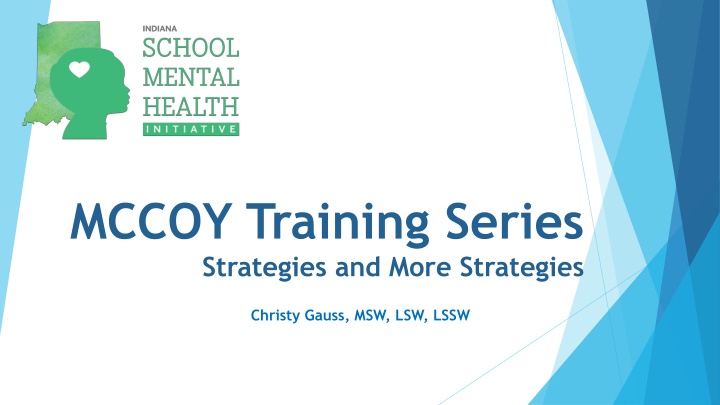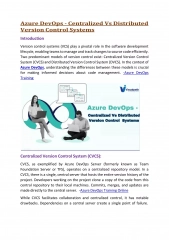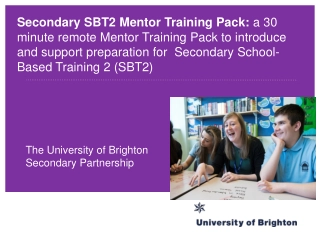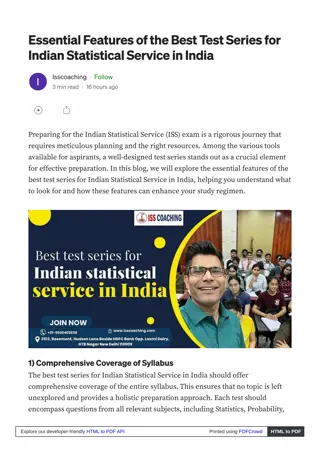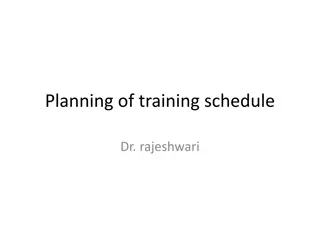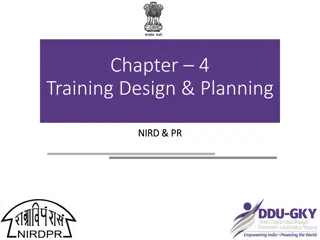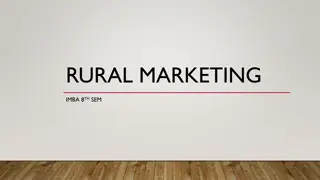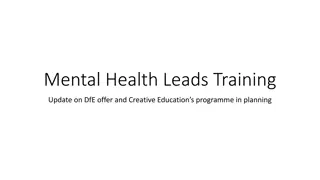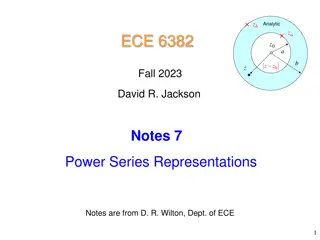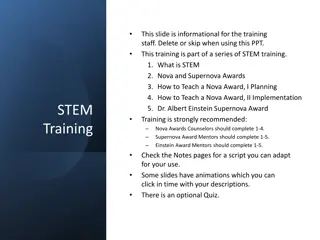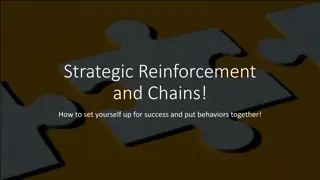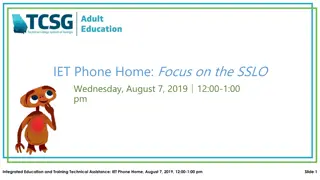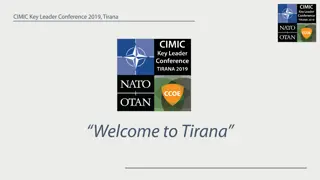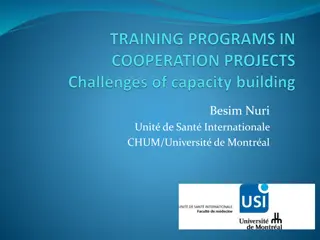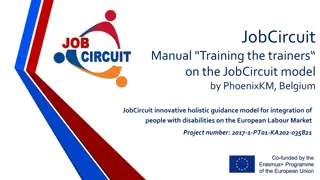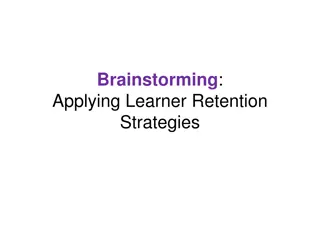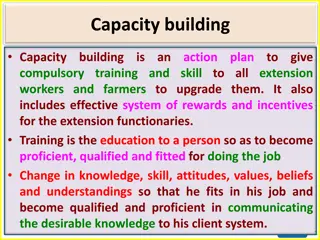Strategies for Effective Training Series
Dive into a comprehensive training series focusing on strategies for development, attachment, trauma, and resiliency. Gain insights on neuro-education, social-emotional variables, and principles of resiliency to empower and support academic success. Enhance your understanding of brain development, cognitive functions, and the impact of emotional regulation on learning outcomes.
Download Presentation

Please find below an Image/Link to download the presentation.
The content on the website is provided AS IS for your information and personal use only. It may not be sold, licensed, or shared on other websites without obtaining consent from the author.If you encounter any issues during the download, it is possible that the publisher has removed the file from their server.
You are allowed to download the files provided on this website for personal or commercial use, subject to the condition that they are used lawfully. All files are the property of their respective owners.
The content on the website is provided AS IS for your information and personal use only. It may not be sold, licensed, or shared on other websites without obtaining consent from the author.
E N D
Presentation Transcript
MCCOY Training Series Strategies and More Strategies Christy Gauss, MSW, LSW, LSSW
Attachment is the carrier of all development. (Dr. Allan Schore) Link to Resources: https://tinyurl.com/ychccrla
Lets Refresh Our Memory You cannot teach the mind until you reach the heart. Key takeaways from ACES and Dr. Lori presentations Two strategies you have implemented Anyone watch Inside Out? Thoughts?
Neuro-education recap Brains develop from the bottom up, and the inside out Main purpose of the brain is survival We are wired for connection Attachment is the carrier of all development Neuroplasticity: Our brains are highly malleable, especially during early years of life Strongest predictor of academic success are the social emotional variables your students bring in to the classroom
Trauma & Brain Development Developmental Trauma Typical Development Cognitio n Social/ Emotional Cognition Social/ Emotional Regulation Regulation Survival Survival Adapted from Holt & Jordan, Ohio Dept. of Education
A study estimating the relative influence of 30 different categories of education, psychological, and social variables on learning revealed that social and emotional variables exerted the most powerful influence on academic performance. CASEL
6 Principles of Resiliency 6 Principles of Resiliency Always Empower Never Disempower Check Maintain High Expectations Assumptions, Observe and Question Provide Unconditional Positive Regard Guided Opportunities for Helpful Participation Be a Relationship Coach
3 Domains (What we teach) Under which to apply Principles (How we teach) Domain 1: Safety, Connection & Assurance Domain 2: Emotional and Behavioral Self- Regulation Domain 3: Competencies (of personal agency, social skills, academic skills)
Teaching Students About Their Brains! Teach students about their neuro-anatomy just as you would teach procedures, transition, classroom agreements and routines: Resources to teach the students about their brain: The Sentis Brain Animation Series https://www.youtube.com/playlist?list=PL53nCCeNj- RQDhbjE9LjvnFad-wdB5bw7 Prefrontal Cortex Teach the book Brain Rules by Medina The Teenage Brain Explained https://www.youtube.com/watch?v=hiduiTq1ei8 Neuroplasticity Amygdala Neuroscience for Kids http://faculty.washington.edu/chudler/neurok.html Hippocampus Edutopia series: https://www.edutopia.org/blog/film- festival-brain-learning Social Brain/Development/Peer Influence Stress Response/Limbic Brain Self-Reflection
SENTIS Animation Series Sentis Animation Series
Dr. Jill Bolte-Taylor: Teenage Brain Teenage Brain (and more!)
3 Domains of Compassionate Schools Emotional connection in the #1 factor in changing the trajectory of ACES Domain 1: Safety, Connection & Assurance 2x10, Bull s Eye, My Rights/My Responsibilities, Validation Questions, Stars: Being Seen, Power of Stories Domain 2: Emotional and Behavioral Self-Regulation Amygdala First Aid Stations, Brain Intervals, Focused Attention Practices, Mindfulness, Safe Keeper System, 90 Second Rule Domain 3: Competencies (of personal agency, social skills, academic skills) Service to others, Giraffe Talk, Positive Referral, SEL, Dual Think Sheets
Questions and Validation How can I help? What do you need? Do you have a plan? How can I help you? What are your resources? What feels difficult? What could be the best possible outcome? What is the worst thing that could happen? What is a first step in improving this situation? That must have made you feel really angry. What a frustrating situation to be in! It must make you feel angry to have someone do that. Wow, how hard that must be.- That s stinks!- That s messed up! How frustrating! Yeah, I can see how that might make you feel really sad. Boy, you must be angry. What a horrible feeling. What a tough spot. I hear you. I hear that. Other
A Superintendent and His Amygdala: Video HSE Superintendent talking about 90 second rule and calming strategies
Boston 24/7 Taking a closer look at our Belief Systems!!
The Needed Perspective Shift What s wrong with you? What happened to you & how can I help?
Where are your students? Where are you?
Creating Resilient Teachers & Staff Self-care is an ethical obligation Put Down the Mirror Emotions are contagious Teachers/staff need to model the behaviors they want to see We can t teach what we don t know. We can t lead where we won t go. (Malcom X)
Some ideas . . . Professional Quality of Life Scale (ProQOL R-IV) Teacher/Staff Amygdala Stations Space to talk about triggers/stresses (what are teachers/staff carrying in?) How are we building community/relationships as a staff? Teams Promote Self-Care Checklist Mindfulness Newsletters (Mindfulness Mondays) Apps Stop, Breathe, Think 10% Happier Resources http://www.10percenthap pier.com/mindfulness- meditation-the-basics
Important for teachers/staff and students! Resilience rests fundamentally on relationships. Suniya Luthar Am I important to someone here? Am I good at something here? Can I affect the world here? Can I share my gifts here?
Book Recommendations The Trauma Informed School: A step-by-step Implementation Guide for Administrators and School Personnel by Jim Sporleder & Heather Forbes Help for Billy by Heather Forbes Brain Rules by John Medina The Boy Who Was Raised as a Dog by Bruce Perry The Heart of Learning and Teaching: Compassion, Resiliency, and Academic Success You have this in Google Drive along with a book study My Stroke of Insight by Jill Bolte-Taylor The Price of Privilege by Madeline Levine Helping Traumatized Children by Massachusetts Advocates for Children: Trauma and Learning Policy Initiative
Video Recommendations How childhood trauma affects health across a lifetime|Nadine Burke Harris https://www.youtube.com/watch?v=95ovIJ3dsNk The Backward Brain Bicycle: Teaching students about their neuroplasticity https://www.youtube.com/watch?v=MFzDaBzBlL0 The Science of Resilience: https://www.youtube.com/watch?v=1r8hj72bfGo Changing The Lens Slide (Chad): https://www.youtube.com/watch?v=sFH6GR0ASKg&t=40s What is Mental Health: https://www.youtube.com/watch?v=ArOTqcMH2G0 Lutheran Foundation s Reducing Stigma Video: https://www.youtube.com/watch?v=dFokp3iczKw Teenage Brain Explained: https://www.youtube.com/watch?v=hiduiTq1ei8 Trust/How to Train Your Dragon: https://www.youtube.com/watch?v=6MDCamjAQVA How to start of movement: https://www.youtube.com/watch?v=V74AxCqOTvg Josh Shipp Every Kid is One Caring Adult Away: http://joshshipp.com/one-caring-adult/ ACES study: http://kpjrfilms.co/resilience/bonus-content/ Bruce Perry 6 Developmental Strengths: https://www.youtube.com/watch?v=skaYWKC6iD4 Above/Below the Line: https://www.youtube.com/watch?v=fLqzYDZAqCI Jill Bolte table/90 second rule/teenage brain https://www.youtube.com/watch?v=PzT_SBl31-s http://www.jbtbrains.org/ Dr. Siegel s Hand/Brain Model: https://www.youtube.com/watch?v=06FUN9vH21k
Questions? Final Thoughts
Go Start a Movement!!!! How to start a movement
Thank You! IndianaSMHI @IN_SMHI Christy Gauss, MSW, LSW, LSSW School Mental Health Facilitator | IN School Mental Health Initiative Indiana Institute on Disability and Community|Indiana University Bloomington jcgauss@indiana.edu 317-908-0988
References Burke, N.J., Hellman, J.L., Scott, B.G., Weems, C.F & Carrion, V.C. (June 2011). The Impact of Adverse Childhood Experiences on an Urban Pediatric Population, Child Abuse and Neglect, 35, No. 6 Child Trends.(2014, July). Adverse Childhood Experiences: National and State-Level Prevalence. Retrieved from https://www.childtrends.org/wp-content/uploads/2014/07/Brief-adverse-childhood- experiences_FINAL.pdf Collaborative for Social, Emotional, & Academic Learning (CASEL). (2003). Safe and Sound: An Educational Leader s Guide to Evidence-Based Social and Emotional Learning (SEL) Programs. Retrieved http://indiana.edu/~pbisin/pdf/Safe_and_Sound.pdf Greenwald O Brien, J.P. (2000), p. 597. See also Craig, S. (1992), p. 67. Kids Count Data Book (2017) https://s3.amazonaws.com/iyi-website/data-book/2017_Data- Book.pdf?mtime=20170227080137 National Alliance for Mental Illness (NAMI). (2014, June). Mental Health Facts: Children & Teens. Retrieved from https://www.nami.org/getattachment/Learn-More/Mental-Health-by-the- Numbers/childrenmhfacts.pdf Perry, B.D. (2002). Neurodevelopmental Impact of Violence in Childhood. In D.H. Schetky and E.P. Benedek (Eds.), Principles and Practice of Child and Adolescent Forensic Psychiatry (pp. 191 203; 200). Washington, DC: American Psychiatric Publishing, Inc Sporleder, J. and Forbes, H.T. (2016). The trauma-informed school: A step-by-step implementation guide for administrators and school personnel. Boulder, CO: Beyond Consequences Institute. Wolpow, R., Johnson, M., Hertel, R. & Kincaid, S. (2016). The heart of learning and teaching: Compassion, resiliency, and academic success. Washington State Office of Superintendent of Public Instruction.
